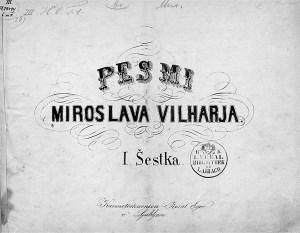
Miroslav Vilhar was a Slovenian composer, poet, dramatist, journalist and politican, who was born on September 7th 1818 in Zgornja Planina pri Rakeku, he died in August 6th 1871. His original name, written in the register, was Freidrich Karl Wilicher, but later he slovenized it.
His schooling started in Postojna, where he finished grammar school and continued with visiting gimnasium in Št. Pavel in Carinthia. After diploma he goes to study law in Graz, later in Wien. In time of living in Graz he was musically and poetically active, but he wrote in German language. His first works were published in year 1842 in German language, he devoted them to Graz’s lawyers. A year later, 1843, he moved back to his home town, where he married Jožefo Dejakovo from Senožeče. They lived in Kalec and had nine children: Evgen, Alfonz, Jožefa, Friderika, Karolina, Franca, Serafina, Julija, Viljemina and Ivana.
In that time he met nationally conscious friends, and with that he found his nationality and his task. So he begins to learn Slovenian language and soon writes his first Slovenian poem Predčutki (en. Prefixes), which is published in Novice in year 1845. He was working and publishing for all leading newspapers with signature Miroslav – Novice (en. News) and Slovenski glasnik (en. Slovenian herald). In letters from Kalec he wrote about current events in his local places. In year 1858, Fran Levstik came to Kalec, to whom Vilhar gave his poems to read, but he did not like to listen his sharp critics.

His poems appeared at readers’ events, and he also took part at this events, once he moved to Ljubljana with his family in year 1861 for schooling of his children and his political engagement. He was elected for Provincial member in March 21st 1861, but he was not particularly gifted for political life. Already on his first session, April 8th, he resented the members when they discussed the Toman’s proposal about Slovene as a debating language, as he supported the German language. Since that time he always supported Slovenian party.
With publishing of first Slovenian political paper Naprej (en. Forward) he started in January 2nd 1863, for his collegue he invites Levstik, who became editor and actual leader. Vilhar was publisher and formal editor. Paper Naprej soon earned black dot with Austrian authorities, due to two published articles: Thoughts about current national borders (author was Pleteršnik with a help of Levstik) and What equality seems to some (author was Levstik). The cause for second article was the rejection of request of mayors from Ljubljana’s surroundings for Slovenian official correspondance. At the same time, the articles were the cause for termination of publishing the newspaper. The last number, 78, was published in September 20th. Vilhar was sentenced to 6 weeks in jail in Žabjak, while serving his sentence he wrote numerous poems and political enigmas, which were published in collection Žabjanke (en. Žabjak collection) in Zagreb in year 1865.

In that year, also his creativity in the music field ends, as after serving his sentence he moved back to Kalec with his family. With this, his all-Slovenian work was impoverished, but despite that the life in Kalec became alive. Castle becomes assembly place of Inner Carniola patriots, where the master enthused them with songs and melodies. In that time, Vilhar was more creative in the field of literature, with that he showed his sensitivity to the current conditions. He reacted fast and correctly on the needs of that time Slovenian cultural life. He wrote and rearranged stage works. Before his death, he spent much time with his son France Serafin, who later became a good composer. Vilhar and his friends organised camp in Kalec in May 9th 1969, and this was the first camp in Inner Carniola. A that time, Vilhar was badly ill, he died due to sudden swelling in August 6th 1871. He is burried in Knežak in the tomb of Vilhar family.
In Slovene literary history, Vilhar was most often metioned as a writer of reading drama and poems, which became a folk tune. A folk tune poems: Na jezeru (en. On the lake), Lipa (en. Lime), Slovenka (en. Slovenian girl), Planinarica (en. Hiking girl), Na goro (en. Up to the mountain). Tominšek in Spomenica (en. Memorandum) tells that Levstik was the greatest influence in Vilhar’s poetry. When he finished his cooperation with Levstik, he took his son-in-law dr. Hinko Dolenc as his evaluator. Slodnjak 1968: 162: ”Due to the content and musical sentimentality his poems did not correspond to the aesthetic level of general Slovenian literary capacity, nor to the real cultural needs”
The works of Miroslav Vilhar were well accepted among the people, as he felt what people needed. And this were simple lyrics, which go into the ear, dark ballads, which show that tragic ends are also possible, short satirical prickles, which describe current political situations and reading games, which in addition to laughter awakened the national consciousness.

